
Ring for Jeeves is a novel by P. G. Wodehouse, first published in the United Kingdom on 22 April 1953 by Herbert Jenkins, London and in the United States on 15 April 1954 by Simon & Schuster, New York, under the title The Return of Jeeves.
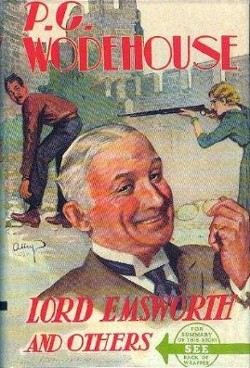
Lord Emsworth and Others is a collection of nine short stories by P. G. Wodehouse, first published in the United Kingdom on 19 March 1937 by Herbert Jenkins, London; it was not published in the United States. The Crime Wave at Blandings, which was published on 25 June 1937 by Doubleday, Doran, New York, is a very different collection, sharing only three of its seven titles with the UK book. Penguin Books published a UK edition of The Crime Wave at Blandings in 1966. The stories in both books had all previously appeared in both British and American magazines.
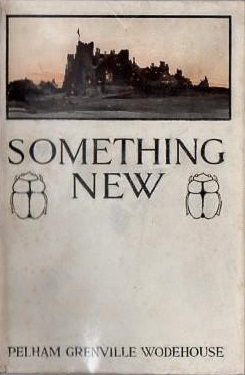
Something Fresh is a novel by P. G. Wodehouse, first published as "Something New" in the United States, by D. Appleton & Company on 3 September 1915. It was published in the United Kingdom as "Something Fresh" by Methuen & Co. on 16 September 1915. There are a number of differences between the American and British versions, but essentially, it is the same book. The novel introduces Lord Emsworth of Blandings Castle, whose home and family reappear in many of Wodehouse's later short stories and novels.

Plum Pie is a collection of nine short stories by P. G. Wodehouse, first published in the United Kingdom on 22 September 1966 by Barrie & Jenkins, and in the United States on 1 December 1967 by Simon & Schuster, Inc., New York. The collection's title is derived from P. G. Wodehouse's nickname, Plum.

Nothing Serious is a collection of ten short stories by P. G. Wodehouse. It was first published in the United Kingdom on 21 July 1950 by Herbert Jenkins, London, and in the United States on 24 May 1951 by Doubleday & Co., New York. It was published again in 2008 by The Overlook Press.

A Few Quick Ones is a collection of ten short stories by P. G. Wodehouse. It was first published in the United States on 13 April 1959 by Simon & Schuster, New York, and in the United Kingdom on 26 June 1959 by Herbert Jenkins, London. The first US edition dust jacket was designed by Paul Bacon. The book's title comes from the informal phrase "a quick one", which is British slang for an alcoholic drink consumed quickly.

Eggs, Beans and Crumpets is a collection of short stories by P. G. Wodehouse, first published in the United Kingdom on April 26, 1940 by Herbert Jenkins, London, then with a slightly different content in the United States on May 10, 1940 by Doubleday, Doran, New York.

Piccadilly Jim is a novel by P. G. Wodehouse, first published in the United States on 24 February 1917 by Dodd, Mead and Company, New York, and in the United Kingdom in May 1918 by Herbert Jenkins, London. The story had previously appeared in the US in the Saturday Evening Post between 16 September and 11 November 1916.

The Man Upstairs is a collection of short stories by P. G. Wodehouse, first published in the United Kingdom on 23 January 1914 by Methuen & Co., London. Most of the stories had previously appeared in magazines, generally Strand Magazine in the UK and Cosmopolitan or Collier's Weekly in the United States. Although the book was not published in the US, many of the stories were eventually made available to US readers in The Uncollected Wodehouse (1976) and The Swoop! and Other Stories (1979).

The Heart of a Goof is a collection of nine short stories by English comic writer P. G. Wodehouse. It was first published in the United Kingdom on April 15, 1926, by Herbert Jenkins, and in the United States on March 4, 1927, by George H. Doran, New York, under the title Divots. The stories were originally published in magazines between 1921 and 1926.

The Coming of Bill is a novel by P. G. Wodehouse. It was published as Their Mutual Child in the United States on 5 August 1919 by Boni & Liveright, New York, and as The Coming of Bill in the United Kingdom on 1 July 1920 by Herbert Jenkins Ltd, London. The story first appeared in Munsey's Magazine (US) in May 1914 under the title The White Hope.

Bill the Conqueror is a novel by P. G. Wodehouse, first published in the United Kingdom on 13 November 1924 by Methuen & Co., London, and in the United States on 20 February 1925 by George H. Doran, New York, the story having previously been serialised in The Saturday Evening Post from 24 May to 12 July 1924.

Mulliner Nights is a collection of short stories by P. G. Wodehouse. First published in the United Kingdom on 17 January 1933 by Herbert Jenkins, and in the United States on 15 February 1933 by Doubleday, Doran. The stories in the collection were originally published in magazines in the UK and the US between 1930 and 1932.

Hot Water is a novel by P. G. Wodehouse, first published on August 17, 1932, in the United Kingdom by Herbert Jenkins, London, and on the same date in the United States by Doubleday, Doran, New York.
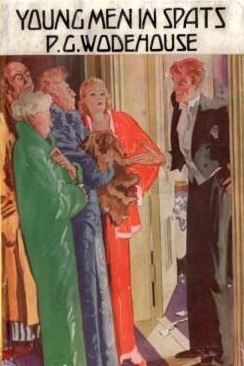
Young Men in Spats is a collection of short stories by P. G. Wodehouse, first published in the United Kingdom on 3 April 1936 by Herbert Jenkins, London, then in the United States with a slightly different selection of stories on 24 July 1936 by Doubleday, Doran, New York.

Money in the Bank is a novel by P. G. Wodehouse, first published in the United States on 9 January 1942 by Doubleday, Doran, New York, and in the United Kingdom on 27 May 1946 by Herbert Jenkins, London. UK publication was delayed while Wodehouse was under suspicion of collaboration during the Second World War. The book was published in English in Germany in August 1949 by Tauchnitz.
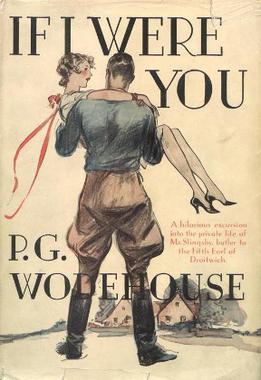
If I Were You is a novel by P. G. Wodehouse, first published in the United States on 3 September 1931 by Doubleday, Doran, New York, and in the United Kingdom on 25 September 1931 by Herbert Jenkins, London.

Reginald "Reggie" Pepper is a fictional character who appears in seven short stories by English author P. G. Wodehouse. Reggie is a young man-about-town who gets drawn into trouble trying to help his pals. He is considered to be an early prototype for Bertie Wooster, who, along with his valet Jeeves, is one of Wodehouse's most famous creations.
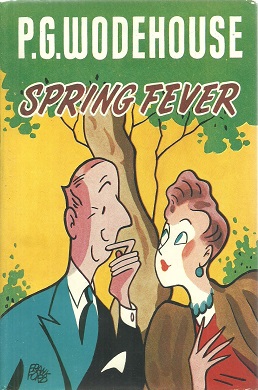
Spring Fever is a novel by P. G. Wodehouse, first published on 20 May 1948, in the United Kingdom by Herbert Jenkins, London, and on the same date in the United States by Doubleday and Co, New York. Although not featuring any of Wodehouse's regular characters, the cast contains a typical Wodehousian selection of English aristocrats, Stoker family relations, wealthy Americans, household staff and imposters.

"The Purity of the Turf" is a short story by P. G. Wodehouse, and features the young gentleman Bertie Wooster and his valet Jeeves. The story was published in The Strand Magazine in London in July 1922, and in Cosmopolitan in New York that same month. The story was also included in the 1923 collection The Inimitable Jeeves.




















